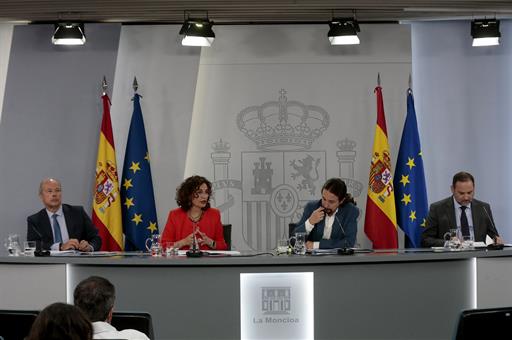Council Minister
Government extends support for mortgages, rents and basic supplies until late September
Council of Ministers - 2020.7.7
Moncloa Palace, Madrid
The Second Vice-President of the Government and Minister for Social Affairs and 2030 Agenda, Pablo Iglesias, claimed that the government has built a social shield "that is assuredly limited and can be improved upon, although historically unprecedented" to alleviate the situation of the Spanish people that have been worst affected by the consequences of COVID-19.
On this matter, he recalled that the government extended the benefits of the Temporary Lay-Off Plans (Spanish acronym: ERTEs) until 30 September, and agreed on unprecedented measures in the tourism sector, He also argued that, in order "not to leave anyone behind", the measures adopted on Tuesday respond to criteria of social justice and to a need for economic efficacy.
Relief from financial burden of mortgages and non-mortgage loans
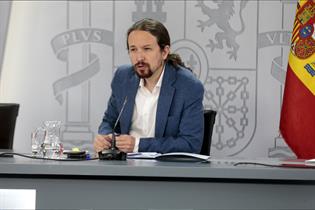 Pool Moncloa /JM CuadradoPablo Iglesias explained that, with the aim of providing relief from the financial burden of those people in a vulnerable situation, the moratorium on mortgage payments on primary residences, buildings associated with economic activities and properties for rent can be applied for until 29 September for a duration of three months. As at 30 June, this support had been granted to more than 200,000 people - representing 83% of all applications registered.
Pool Moncloa /JM CuadradoPablo Iglesias explained that, with the aim of providing relief from the financial burden of those people in a vulnerable situation, the moratorium on mortgage payments on primary residences, buildings associated with economic activities and properties for rent can be applied for until 29 September for a duration of three months. As at 30 June, this support had been granted to more than 200,000 people - representing 83% of all applications registered.
Similarly, this deadline is extended to the moratorium on non-mortgage loans and consumer credit, with 384,000 applications already granted - representing 85% of the total registered.
Protection for vulnerable tenants
The Second Vice-President of the Government indicated that the six-month extension to rental agreements on primary residences can be applied for until 30 September. Applications under the moratorium, the deferral of rental payments and the total or partial write-off of payments for tenancy agreements, in the event that the landlord holds a large portfolio of properties, can be applied for until 30 September for those households in a situation of economic vulnerability.
Basic supplies guaranteed
With the aim of guaranteeing access to the basic supplies of vulnerable consumers, Pablo Iglesias announced that the social voucher will be extended until 30 September. The guarantee of water and energy supplies to domestic consumers at their primary residence will also be extended until the same date. According to the Second Vice-President of the Government, this is in addition to the suspension on evictions, which will remain in force until 2 October 2020.
Reactivation of transport and housing
The Council of Ministers approved a Royal Decree-Law that contains measures to reactivate the economy in the fields of transport and housing and to address the impact of the coronavirus.
The Minister for Transport, Mobility and Urban Agenda, José Luis Ábalos, explained that this law has three main aims - to protect the health of workers and travellers, guaranteeing the availability of essential goods and services; to provide liquidity to companies in the transport sector to preserve their variability, boost their activity and foster their recovery; and to reduce administrative burdens.
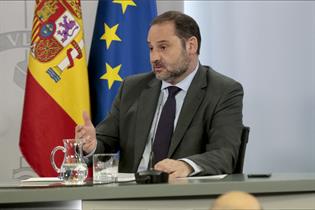 Pool Moncloa /JM CuadradoThe economic amount of the measures for private companies in the transport sector and to reduce harbour fees amounts to 663 million euros, in addition to 1 billion euros to increase the capacity of RENFE's debt, with the aim of compensating the drop in demand and of boosting the recovery of services. A further 110 million euros will be allocated to the State Company for Land Transport Infrastructures (Spanish acronym: SEITTSA) to cater for their public works commitments underway.
Pool Moncloa /JM CuadradoThe economic amount of the measures for private companies in the transport sector and to reduce harbour fees amounts to 663 million euros, in addition to 1 billion euros to increase the capacity of RENFE's debt, with the aim of compensating the drop in demand and of boosting the recovery of services. A further 110 million euros will be allocated to the State Company for Land Transport Infrastructures (Spanish acronym: SEITTSA) to cater for their public works commitments underway.
José Luis Ábalos specified that these funds are in addition to the 800 million euros allocated to public transport in the autonomous regions and to the tax breaks for the sector to address the impact of the coronavirus.
The minister specified that in the air transport sector, the Royal Decree-Law establishes that the recommendations of the European Union Air Safety Agency (EASA) for passenger and crew safety will be compulsory.
As regards the maritime sector, José Luis Ábalos highlighted that the reduction in the quotas of harbour and mooring fees will be temporarily extended, and facilities will be made for the inspections that Spanish vessels are subject to.
In the road transport sector, a moratorium will be established for the payment of the principal on instalments for all loans for the purchase of coaches and lorries for independent contractors and for passenger transport companies. The measures adopted, specified the minister, will allow a deferral of up to 350 million euros for goods transport and up to 250 million euros for passenger transport.
Measures on housing
The Royal Decree-Law includes social and economic measures on housing to protect families and reactivate the sector.
José Luis Ábalos announced that the government will make concessions of public land through the Public Business Entity for Land (Spanish acronym: SEPES) for up to 75 years, so that private companies can build social housing for rent. The minister stated that this is a measure with "great incentives" to make the economy more dynamic, generate an expectation for the investment sector committed to housing and create a portfolio of better quality public housing than at present.
Furthermore, the regional governments that have not spent the money received under the State Housing Plan will not have to return it if they apply it to other plans related to access to housing.
Reactivation of justice after coronavirus
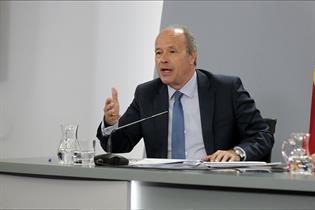 Pool Moncloa /JM CuadradoThe Minister for Justice, Juan Carlos Campo, presented the measures contained in the action plan to provide relief for the accumulation of pending court cases deriving from the health crisis. The plan will be deployed over two phases in the employment, mercantile and administrative systems and will affect 315 courts.
Pool Moncloa /JM CuadradoThe Minister for Justice, Juan Carlos Campo, presented the measures contained in the action plan to provide relief for the accumulation of pending court cases deriving from the health crisis. The plan will be deployed over two phases in the employment, mercantile and administrative systems and will affect 315 courts.
Intervention will take place in the first phase - from 1 September to 31 December - in those courts with the largest workload of employment and mercantile matters. Measures will be applied to strengthen those judicial districts with a workload in excess of 130% and external support measures will be deployed in courthouses. In addition, 21 courts will be set up to absorb and minimise the impact of the increase in case numbers.
In the second phase, which will begin on 1 January 2021, more specific information will be provided on the volume of claims presented and the deadline for their resolution, which will make it easier to extend the measures.
The minister stated that this is an objective action plan, which may be speeded up if necessary and will allow a response to be provided for courts in the post-covid era.
Procedural and civil reform of disability
The Council of Ministers approved the submission for its passage through Parliament of the draft law to reform civil and procedural legislation on disability with the aim of allowing people with a disability to take decisions more independently and with less oversight than at present.
Juan Carlos Campo explained that the situation of wardship is regulated, which will now only apply to minors, because the only thing that people with some form of disability require will be support. In this regard, he said, what they exteriorise will be taken into account, and this can be done on a preventive basis in the event of becoming disabled, which makes the mandate valid. "This is a type of will that allows you to say what will happen if you fall into this situation, and how support will be provided. The basic figure is no longer a form of wardship, which disappears for this purpose, but in fact supervision".
The minister highlighted that the future legislation has "been fully agreed", and hence trusts that its passage through Parliament will be swift.
Other agreements
The Council of Ministers approved the Action Plan to Prevent and Fight Wildfires 2020, in which 12 ministerial departments take part.
The government also agreed to reform the recast text of the Intellectual Property Act to allow the presence of music publishers on the governing bodies of the entity that manages intellectual property rights.
It also declared the Spanish Formula 1 Gran Prix to be an exceptional event of public interest, and authorised the Cinema and Audio-visual Arts Institute to call a round of proposals to support cinemas for more than 13 million euros.
Social protection and reactivation of economy
During her presentation at the press briefing following the Council of Ministers, the Minister for the Treasury and Government Spokesperson, María Jesús Montero, highlighted that all the measures adopted seek to boost our productive fabric, recover jobs that were suspended and generate new work opportunities, primarily for young people. Similarly, they seek to protect the income of the middle and working classes and the most vulnerable groups.
Current affairs
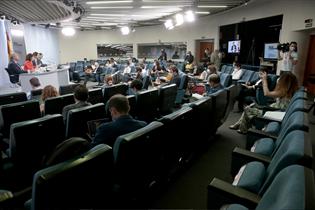 Pool Moncloa /JM CuadradoMaría Jesús Montero recalled that last week the Pact for Economic Reactivation and Employment was signed, a clear message of confidence of unity of all those that "must be essential to reactivate our economy, and to seek agreed solutions to strengthen our productive fabric and workers' rights".
Pool Moncloa /JM CuadradoMaría Jesús Montero recalled that last week the Pact for Economic Reactivation and Employment was signed, a clear message of confidence of unity of all those that "must be essential to reactivate our economy, and to seek agreed solutions to strengthen our productive fabric and workers' rights".
This is also an unequivocal message aimed at our European partners, she continued, so that they can see that the whole country is engaged in this reconstruction task. "Business organisations, trade unions and the government continue to work side-by-side to reach agreements that allow this sound, sustainable and inclusive growth", she added.
The Government Spokesperson also recalled that the President of the Government, Pedro Sánchez, began on Monday, together with the Prime Minister of Portugal, a round of contacts with his European counterparts to prepare the upcoming Summit of Heads of State and Government, Spain will call for the internal market to be strengthened to serve as a driver of the reconstruction with a strong and speedy investment.
María Jesús Montero also stated that the university entrance exams (Spanish acronym: EBAU) are being held normally in the different autonomous regions, and thanked the regional authorities for their coordination in enhancing student safety.





